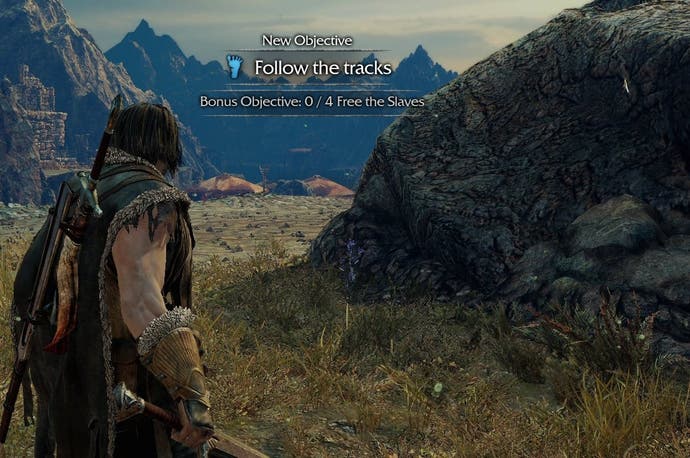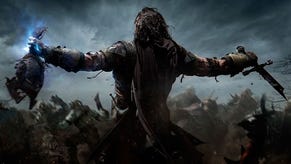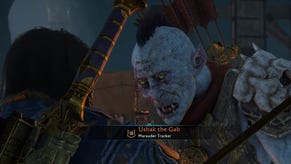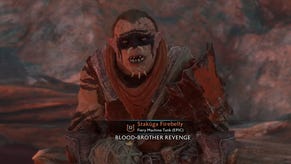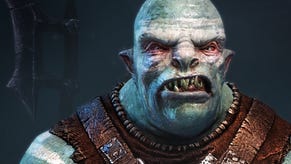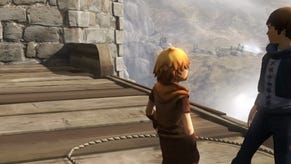Let's have more games that show rather than tell
Shadow of Mordor becomes great, but introduces itself poorly.
The success of games like Far Cry 3 and Middle-earth: Shadow of Mordor suggests that emergent possibilities arising from a clash of systems are becoming a bigger deal in open-world games, something that Chris Donlan wrote about earlier this week, and I imagine anyone who's ever been asked to follow someone from a rooftop is delighted to hear it. But while Shadow of Mordor is a fine game in many respects - and seemingly destined to become that weird rarity, the cult blockbuster - it does suffer from one disease of the modern open-world game that I wish designers would try to cure.
Having embraced second screens at a tender age, nowadays I have the attention span of a goldfish, so for me the first couple of hours of Shadow of Mordor were painful. The prologue where you learn the basics of combat and stealth isn't so bad, but once your family has been slain and you're sent off to avenge them, Shadow of Mordor quickly evolves into one of the growing number of open-world AAA games that has around a billion mechanics and cannot shut up about them.
Thinking back to the early days of 3D open-world games - at least as we know them now - it used to be that Grand Theft Auto would introduce its mechanics through a series of early missions, and while this was a little crude, it was easy enough to live with when you considered the richness of invention elsewhere. (Also because the cut-scenes were funny, the driving between locations was satisfying and there wasn't too much to take in.) But in hindsight, it's a shame that this approach has never been re-examined. Instead it's been codified and ornamented for over a decade - and the result is games like Shadow of Mordor, which barely let you push a button without interfering.
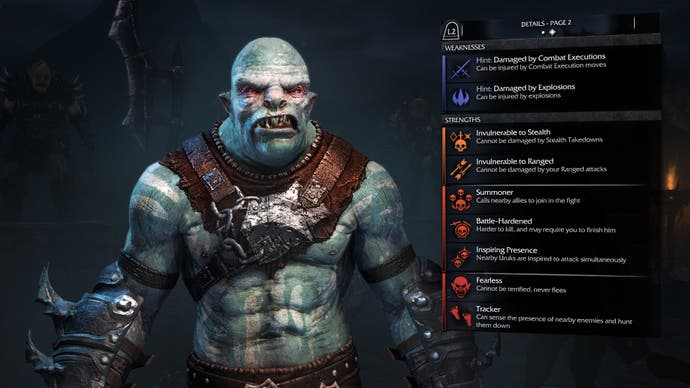
Whatever you're doing - whether you're swinging a weapon, climbing a wall or advancing into a new area - it can't help announcing another new concept or dragging you off onto another screen to show you a blizzard of icons and information panes, most of which have their own nested menus or sub-objectives. Sauron's Army! Weapons & Runes! Upgrades! Abilities! Mirian! View the map to see nearby herbs. A beast you're hunting is nearby. Press right to equip. Press this to that. Go here to this. At one point I was interrupted three times fighting the same Orc. And of course it does this in addition to entire missions devoted to introducing even more elaborate mechanics.
Obviously this phenomenon is hardly unique to Shadow of Mordor (I'm looking at you, Ubisoft), but it does feel particularly acute here. Perhaps this is because I came to Monolith's game straight off the back of The Vanishing of Ethan Carter. If you haven't played The Astronauts' debut game, which is a first-person adventure, the only information it offers about how it works is a warning that it won't hold your hand along with some oblique dialogue from the player character, whom we learn is a detective summoned to Red Creek Valley by a letter from a boy called Ethan Carter. Beyond that, the game has no tutorials or pop-ups and nobody stands in front of you and tells you what to do. You have to figure it out on your own.
It even extends this approach to storytelling. When you get to the end of the game, it offers you the final piece of the puzzle in a cut-scene, but it doesn't tell you what it all means. There are a few little leaps of logic you can make about what's happened based on what is revealed, but the designers never force it. Perhaps they realise that The Vanishing of Ethan Carter is the kind of game that stays with you, rumbling around in your head, and whether you see things coming, work them out at the end or decipher the clues in hindsight, that is more satisfying than being explicitly told what is going on.
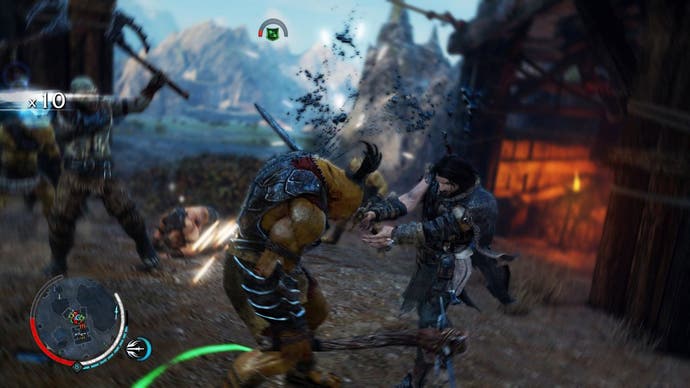
More relevant to Shadow of Mordor though - which, with the greatest respect, does not have a story that requires very much figuring out - even the mechanics in The Vanishing of Ethan Carter are fun to work out on your own. Doing so makes you feel more like the detective you're playing. Some critics have even noted that they would rather not tell you how the game actually works in order to preserve the delight of discovery. Shadow of Mordor is a surprisingly fun game eventually, but I don't think I would include the phrase "delight of discovery" in any summary of its first few hours - it's a game that only becomes interesting, at least to me, once the developers get out of the way.
I've always liked the idea that games, like any creative medium, can benefit from showing rather than telling. Ernest Hemingway used to say that if writers really know what they're doing then they can omit certain details and trust the reader to understand them implicitly. "The dignity of movement of an iceberg is due to only one-eighth of it being above water." And I wonder, would a game like Shadow of Mordor - with its myriad systems designed to interlace ever more enjoyably and elaborately - still work if it tried to apply the iceberg theory, rather than reaching for endless exposition?
Simply strip the tutorial interruptions out of a game like Shadow of Mordor and the answer is probably not. If you never noticed the Runes menu, for instance, you would find the game much harder because you'd become significantly underpowered. But if you began designing a game like Shadow of Mordor with the goal of "giving players more strength through weapon augmentations" and had to turn that into a mechanic that you couldn't introduce with a tutorial, an interruption or a pop-up? What would the systems you created then look like? Where would that take you as a designer?
I don't know the answer, but I'd love to play an open-world game that tries to figure out. If nothing else, I suspect it would make those first few hours a bit more exciting.
